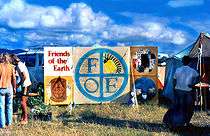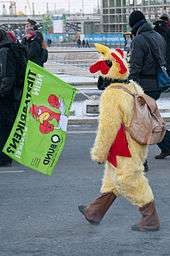Friends of the Earth
.svg.png) | |
| Abbreviation | FoEI |
|---|---|
| Formation | 1969 |
| Founder |
|
| Focus | |
Area served | Global |
Members | 75 national member groups |
Key people |
|
Volunteers | some 5,000 local activist groups |
| Website |
www |
Friends of the Earth International (FoEI) is an international network of environmental organizations in 74 countries.[2]
Friends of the Earth was founded in 1969 as an anti-nuclear group by Robert O Anderson[3] who contributed $200,000 in personal funds to launch FOTE with David Brower, Donald Aitken and Jerry Mander after Brower's split with the Sierra Club. FOTE main mission was to lock up and prevent further development of nuclear energy.[4][5] Their first employee was Amory Lovins, who kicked off FOE in the UK. It became an international network in 1971 with a meeting of representatives from the U.S., Sweden, the UK and France.[6] For further historical details, see articles on the national FOE organizations.
FoEI is assisted by a small secretariat (based in Amsterdam, Netherlands) which provides support for the network and its agreed major campaigns. The executive committee of elected representatives from national groups sets policy and oversees the work of the secretariat. In 2010, Nigerian activist Nnimmo Bassey was elected to serve as chair of Friends of the Earth International.[7]
Campaign issues
Friends of the Earth considers environmental issues in their social, political and human rights contexts. Their campaigns stretch beyond the traditional arena of the conservation movement and seek to address the economic and development aspects of sustainability. Originally based largely in North America and Europe, its membership is now heavily weighted toward groups in the developing world.
The current campaign priorities of Friends of the Earth internationally are:[8]
- economic justice and resisting neoliberalism
- forests and biodiversity
- food sovereignty
- climate justice and energy (Including releasing the song "Love Song To the Earth")
The campaign priorities are set at the bi-annual general meeting of Friends of the Earth International.
In addition to the priority campaign areas Friends of the Earth International has a number of other campaign areas which are active internationally. They include:[8]
- desertification
- Antarctica
- water
- maritime
- mining and extractive industries
- nuclear power (see nuclear debate)[9]
- consumption and intensive meat production (see Meat Atlas)[10]
All FoE International campaigns incorporate elements of three core themes which are:[8]
- protecting human and environmental rights
- protecting the planet's disappearing biodiversity
- the repayment of ecological debt owed by rich countries to those they have exploited.
Successes attributed to FOEI since their founding include their help in leading efforts which have:
*Eliminated billions in taxpayer subsidies to corporate polluters; *Reformed the World Bank to address environmental and human rights concerns; *Pushed the debate on global warming to pressure the U.S. to attempt the best legislation possible; *Stopped more than 150 destructive dams and water projects worldwide; *Pressed and won landmark regulations of strip mines and oil tankers; and *Banned international whaling.[11]
Friends of the Earth groups

The Friends of the Earth in each country are themselves many-tiered networks reaching from individual activists up to the national pressure group which campaigns for environmentally progressive and sustainable policies. The groups and activists at all levels also carry out educational and research activities.
Friends of the Earth groups are required to act independently of party political, religious or other influences; be open, democratic and non-discriminatory in their internal structures; and be willing to cooperate with other organizations who are working for the same goals.[12] These are conditions of remaining a member of FOEI.[12]
The national groups work on the main issues affecting their own country and choose to participate in the international campaigns of FoEI which are relevant to them. In turn, the local campaigners can work on local, national and/or international campaigns.
Structure of the network
The member organization in a particular country may name itself Friends of the Earth or an equivalent translated phrase in the national language, e.g., Friends of the Earth (US), Friends of the Earth (EWNI) (England Wales and Northern Ireland), Amigos de la Tierra (Spain and Argentina). However, roughly half of the member groups work under their own names, sometimes reflecting an independent origin and subsequent accession to the network, such as Pro Natura (Switzerland), the Korean Federation for Environmental Movement, Environmental Rights Action (FOE Nigeria) and WALHI (FOE Indonesia).
Friends of the Earth International (FoEI) is supported by a secretariat based in Amsterdam, and an executive committee known as ExCom.[13] The ExCom is elected by all member groups at a general meeting held every two years, and it is the ExCom which employs the secretariat.[14] At the same general meeting, overall policies and priority activities are agreed.
In addition to work which is coordinated at the FoEI level, national member groups are free to carry out their own campaigns and to work bi- or multi-laterally as they see fit, as long as this does not go against agreed policy at the international level.
Publications

Diet for a Small Planet by Frances Moore Lappé, 1971
The Meat Atlas is an annual report on the methods and impact of industrial animal agriculture. The publication consists of 27 short essays and, with the help of graphs, visualises facts about the production and consumption of meat. The Meat Atlas is jointly published by Friends of the Earth and Heinrich Böll Foundation.[15]
Climate change
- Intergovernmental Panel on Climate Change (IPCC) Fifth Assessment, Working Group 2 report Friends of the Earth FoE February 2014
- Ten key findings of the IPCC Working Group 3 report on climate mitigation
Notable supporters
- Mark Gordon, Wyoming state treasurer, was his state's representative to Friends of the Earth board in the early 1980s.
- Rock musician George Harrison became associated with Friends of the Earth after attending their anti-nuclear demonstrations in London in 1980. He dedicated his 1989 greatest hits album, Best of Dark Horse, to Friends of the Earth, among other environmental organisations.[16]
- Jay Kay, frontman of the funk/acid jazz group Jamiroquai, is known for donating a part of the profits earned from his album sales to Friends of the Earth and Oxfam, among other things.
- Dominique Voynet, who ran in the 1995 and 2007 French presidential elections in the "les verts" parti, or Green Party, is a member.
- Thom Yorke, lead singer of Radiohead, has publicly supported a number of Friends of the Earth campaigns.
- A chorus of superstar voices on "Love Song to the Earth" — including Paul McCartney, Jon Bon Jovi, Sheryl Crow, Fergie, Sean Paul, and Colbie Caillat—join forces on this inspirational pop anthem. All proceeds from each sale of the single will be donated to Friends of the Earth U.S. and the United Nations Foundation.
Support for The Big Ask
Among those present at the launch of Friends of the Earth (EWNI)'s climate change campaign The Big Ask were: Jude Law,[17] Edith Bowman, Siân Lloyd, Ross Burden, David Cameron, David Miliband, Thom Yorke, Stephen Merchant, Michael Eavis, and Emily Eavis.[18]
Member organizations

Africa
Asia
- Indonesian Forum for Environment, Indonesia
- Korean Federation for Environmental Movement
- Friends of the Earth Middle East
Europe
- Friends of the Earth Europe, Brussels
- Young Friends of the Earth Europe, Brussels
- Friends of the Earth – France
- Friends of the Earth Scotland
- Pro Natura (Switzerland)
- Amigos de la tierra, Spain
- Bund für Umwelt und Naturschutz Deutschland, Germany
- Friends of the Earth (EWNI), England, Wales and Northern Ireland
- GLOBAL 2000, Austria
- Friends of the Earth Malta
- Friends of the Earth – Ibiza – (Catalan, Spanish, English, German)
- Friends of the Earth Finland
- Magyar Természetvédok Szövetsége / Friends of the Earth Hungary
- Priatelia Zeme Slovensko (Friends of the Earth Slovakia)
- Green Action, Croatia
- Hnutí DUHA, Czech Republic
- Milieudefensie, Netherlands
- Norwegian Society for the Conservation of Nature, Norway
- Friends of the Earth (Malta)
North America
- Friends of the Earth Canada
- Les AmiEs de la Terre de Québec, Canada
- Friends of the Earth (US)
South America
- Amigu di Tera, Curaçao
- Sobrevivencia – Amigos de la Tierra PY, Paraguay
- AmiGoS dA TeRRa – BraSiL
Oceania
Bibliography
- Brian Doherty and Timothy Doyle, Environmentalism, Resistance and Solidarity. The Politics of Friends of the Earth International (Basingstoke: Palgrave, 2013).
- Jan-Henrik Meyer, “'Where do we go from Wyhl?' Transnational Anti-Nuclear Protest targeting European and International Organisations in the 1970s,” Historical Social Research 39: 1 (2014): 212-235.
Notes and references
- ↑ "Friends of the Earth International is proud to announce Jagoda Munić as our new chairperson". Friends of the Earth International. Retrieved 2012-11-14.
- ↑ "About Friends of the Earth International". Friends of the Earth International. Retrieved 2009-06-25.
- ↑ Gibson, Donald (2002-01-01). Environmentalism: Ideology and Power. Nova Publishers. pp. 64, 65, 86. ISBN 1-59033-149-4. Retrieved 2013-08-06.
Robert O Anderson... provided seed money for the creation of Friends of the Earth
- ↑ Washington Hunt, George (2009). "The Big Bad Bank". Retrieved 2013-08-06.
Robert O. Anderson contributed $200,000 in personal funds to launch the radical environmental group, Friends of The Earth
- ↑ Washington Hunt, George. The Big Bad Bank. Retrieved 2013-08-06.
- ↑ "History". Retrieved 25 May 2016.
- ↑ Focus on Nnimmo Bassey and ERA, Friends of the Earth International.
- 1 2 3 "Home - Friends of the earth international". Retrieved 25 May 2016.
- ↑ ""Where do we go from Wyhl?" Transnational anti-nuclear protest targeting European and international organizations in the 1970s". Retrieved 25 May 2016.
- ↑ "Home - Friends of the earth international". Retrieved 25 May 2016.
- ↑ http://www.foei.org/member-groups/north-america/united-states-of-america
- 1 2 "Home - Friends of the earth international". Retrieved 25 May 2016.
- ↑ "International secretariat". Retrieved 25 May 2016.
- ↑ "Home - Friends of the earth international". Retrieved 25 May 2016.
- ↑ Meat Atlas, Friends of the Earth, download Meat Atlas as pdf
- ↑ Harry, Bill (2003). The George Harrison Encyclopedia. London: Virgin Books. pp. 28, 85. ISBN 978-0753508220.
- ↑ Radiohead's Thom Yorke to guest-edit Observer Magazine published March 20, 2008.
- ↑ "Big names back The Big Ask". Friends of the Earth. Retrieved 25 May 2016.
- ↑ Friends of the Earth Europe, We are fed up: 30,000 march in Berlin, 19 January 2014
See also
- Friends of the Earth, Inc. v. Laidlaw Environmental Services, Inc.
- List of environmental organizations
External links
| Wikimedia Commons has media related to Friends of the Earth. |
- Official website
- Article of Friends of the Earth France "Multinationals : Ecologists See Red"
- Friends of the Earth International YouTube channel